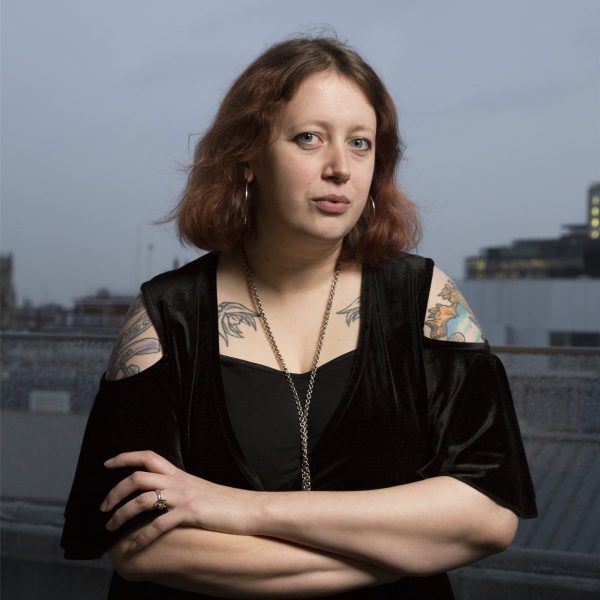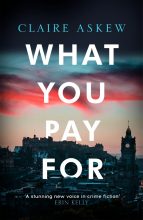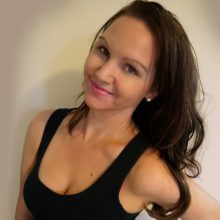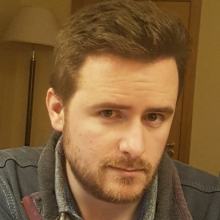What You Pay For by Claire Askew
What led you into writing?
I’ve loved to write stories ever since I was a little child, but I’m indebted to my parents for introducing me to them. When I was small, my mum would take me to the local library almost every day – or rather, she says, I would take her! My dad read stories to my little brother and I every night without fail, and did all the voices. His storytelling was so good that in summer, when the windows were open, the next-door neighbours used to come and stand outside our house to listen!
How does a typical day look?
My brain is never in gear in the mornings, so I don’t do any ‘proper’ writing then. An ideal writing day starts with breakfast and a bit of journaling – what some people might call Morning Pages. I read Tarot, and will quite often pull a card to prompt the writing I do in my journal. Then I’ll do up front all the things that might tempt me to procrastinate if I left them: laundry and other housework, emails, etc. I usually eat lunch quite late, and fuel up for the writing. I work best from 3pm onwards, and if things are going well, can happily write on until about 10 or 11 at night. But that’s a good day!
In what ways do your characters test your abilities?
It’s important to me that my books are diverse, as a true reflection of the world, but I am very aware of the boundaries around writing characters whose background and experiences are different to my own. For example, my protagonist, DI Birch, has a best friend, Amy, who is Japanese-Scottish, and Birch’s on-off love interest, Anjan, is originally from Nepal. I have to work to make sure that, as a white writer, I am writing these people as characters, not caricatures, and I need to make sure my writing of them is respectful and not tokenising. I always make sure my manuscripts get at least one sensitivity read. This is essential work, and it’s important I’m always conscious of it.
What’s your setup?

Quite boringly, I write from my sofa. I usually have a giant cup of tea at my elbow and my notebook at my side for scribbling ideas or reading back over my plot notes. I write on a battered, sticker-covered laptop that’s travelled with me to all sorts of places. And yes, that is a Sheffield Wednesday FC cushion!
What lasting effects have your favourite authors had on your writing and style?
Jennifer Egan taught me that every sentence is important and needs to be written carefully, with an eye on rhythm and imagery. Louise Welsh taught me that traditional ideas about genre fiction don’t need to constrain you. I’m still learning from Margaret Atwood’s pin-sharp dialogue. And I am deeply indebted to the many poets I’ve read and loved for teaching me about the richness and verve that is possible in economy.
What do you do for inspiration?
Read. It’s the only way, for me.
What repeating themes do you find yourself pulling into your stories?
I’m very interested in toxic masculinity, and I feel like everything I write – poetry and fiction – has an eye on wanting to get to the bottom of it.
How do you wind down?
I’m pretty bad at this: at the end of my day I’m usually still working – on my side-hustle, a little vintage jewellery store on Etsy, called Edinburgh Vintage. But of course I love a good book, especially a book about witchcraft history, a topic I’m fascinated by. That, and scrolling through Tumblr. I think I must be the oldest person still on Tumblr!
What sort of challenges do you regularly overcome while world-building?
I was a poet for ten years before I ever wrote fiction, so my biggest challenge is my poet-brain wanting to interrupt and describe the dust motes in a sunbeam or the sound the trees make in the wind. I have to remind myself that in a crime novel, a little of that goes a long way!
What’s the most useful advice you could give to an aspiring author?
I’m going to speak directly to the women writers here, and say: believe you deserve it. I meet so many women who are aspiring writers but who are certain from the off that their writing will never make it. That’s going to turn into a self-fulfilling prophecy. Before your novel gets an agent or is picked up for publication, it is going to need someone to champion it. The only person who can do that is you. Believe in your book, believe in yourself – or at least fake it, until you can.
Tell us about the book you’re promoting.
What You Pay For is the second book in the Edinburgh-based DI Birch crime series. It follows All The Hidden Truths, published in 2018: a novel in which newly-promoted DI Helen Birch struggled to focus in the aftermath of a huge tragedy due to being repeatedly reminded of her little brother, Charlie, who disappeared without trace 13 years ago. Charlie’s case is cold, and he’s presumed dead: in What You Pay For, Birch observes the 14th anniversary of his disappearance on the day she participates in a dawn raid and helps arrest a notorious mob boss. Two days later, Charlie shows up on Birch’s doorstep at 2am. It’s not a coincidence: when she finds out where he’s been, she realises they’re both in big trouble.
👋 Hi! I run Author Interviews
As a new writer I found myself itching to contribute to a thriving, creative community, so I made Author Interviews and I've met loads of wonderful people in the process. You can buy my debut fantasy RINGLANDER: THE PATH AND THE WAY from Amazon.


 Audible
Audible


